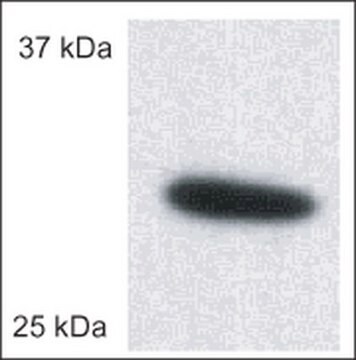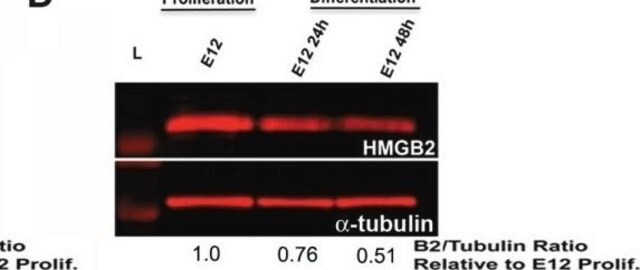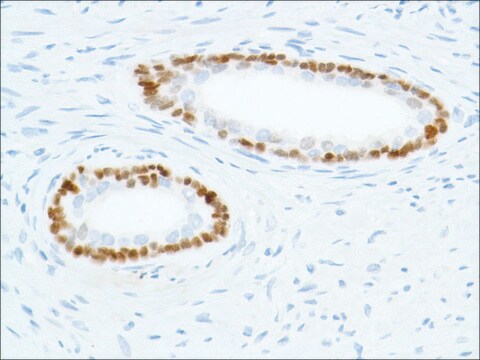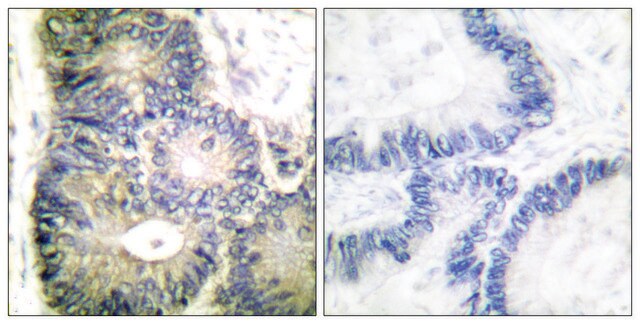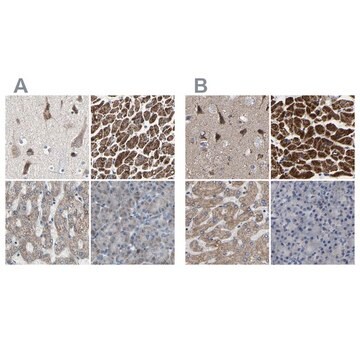ABN302
Anti-Complex I-75kD Antibody
from rabbit, purified by affinity chromatography
Synonym(e):
NADH-ubiquinone oxidoreductase 75 kDa subunit, mitochondrial, Complex I-75kD, CI-75kD
About This Item
Empfohlene Produkte
Biologische Quelle
rabbit
Qualitätsniveau
Antikörperform
affinity isolated antibody
Antikörper-Produkttyp
primary antibodies
Klon
polyclonal
Aufgereinigt durch
affinity chromatography
Speziesreaktivität
mouse, rat, human
Speziesreaktivität (Voraussage durch Homologie)
bovine (based on 100% sequence homology), chimpanzee (based on 100% sequence homology)
Methode(n)
immunohistochemistry: suitable (paraffin)
western blot: suitable
NCBI-Hinterlegungsnummer
UniProt-Hinterlegungsnummer
Versandbedingung
wet ice
Posttranslationale Modifikation Target
unmodified
Angaben zum Gen
human ... NDUFS1(4719)
Allgemeine Beschreibung
Immunogen
Anwendung
Neurowissenschaft
Entwicklungsabhängige Signalübertragung
Western Blotting Analysis: A 1:5,000 dilution from a representative lot detected Complex I-75kD in rat brain, human brain, and human heart tissue lysates.
Immunohistochemistry (Paraffin) Analysis: A 1:1,000 dilution of this antibody detected Complex I-75kD in human kidney and human heart tissue sections.
Note: Actual optimal working dilutions must be determined by end user as specimens, and experimental conditions may vary with the end user.
Qualität
Western Blotting Analysis: A 1:5,000 dilution of this antibody detected Complex I-75kD in mouse brain tissue lysates.
Zielbeschreibung
Physikalische Form
Lagerung und Haltbarkeit
Sonstige Hinweise
Haftungsausschluss
Sie haben nicht das passende Produkt gefunden?
Probieren Sie unser Produkt-Auswahlhilfe. aus.
Lagerklassenschlüssel
12 - Non Combustible Liquids
WGK
WGK 1
Flammpunkt (°F)
Not applicable
Flammpunkt (°C)
Not applicable
Analysenzertifikate (COA)
Suchen Sie nach Analysenzertifikate (COA), indem Sie die Lot-/Chargennummer des Produkts eingeben. Lot- und Chargennummern sind auf dem Produktetikett hinter den Wörtern ‘Lot’ oder ‘Batch’ (Lot oder Charge) zu finden.
Besitzen Sie dieses Produkt bereits?
In der Dokumentenbibliothek finden Sie die Dokumentation zu den Produkten, die Sie kürzlich erworben haben.
Unser Team von Wissenschaftlern verfügt über Erfahrung in allen Forschungsbereichen einschließlich Life Science, Materialwissenschaften, chemischer Synthese, Chromatographie, Analytik und vielen mehr..
Setzen Sie sich mit dem technischen Dienst in Verbindung.